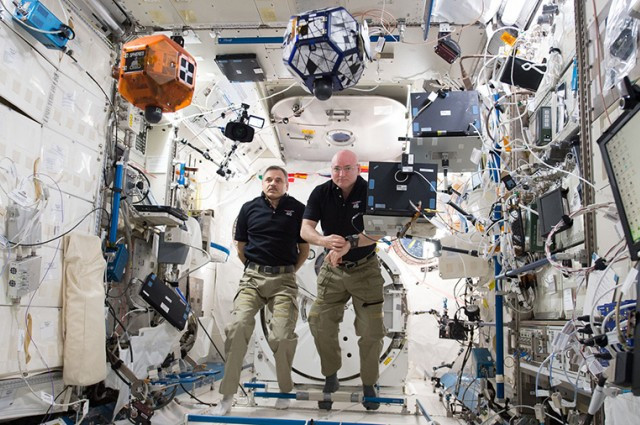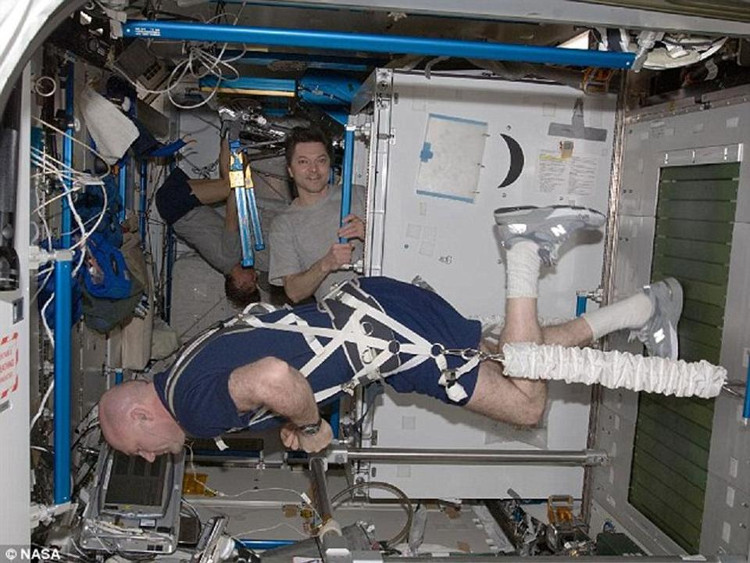After being in outer space, how do astronauts change when they return to Earth?
Not only are they subjected to height changes, astronauts also have to deal with other major changes in the body in a zero gravity environment.
After working at the International Space Station ISS for 340 days in a row, three astronauts Scott Kelly, Mikhail Borisovich Kornienko and engineer Sergey Volkov were greeted by the scientific and technical community in an empty field at Kazakhstan after 3 hours left the ISS.

Astronauts return to Earth.
The three astronauts' trip is one of the "One-year-Mission" projects, which aims to study mental and physical changes in long-term living in zero gravity. Create a premise for future Mars discovery projects of humanity.
After nearly a year of living on the ISS space station, as soon as they returned to the ground, NASA experts realized that the difference in Kelly Scott was that he was about 5cm taller than before he joined the mission.

The zero gravity environment has released pressure on the spine so that they can stretch about 3% more.
Explaining the change, experts say, in a zero-gravity environment released pressure on the spine makes them expand by about 3% , for Scott Kelly's case, the increase is about 5cm because of the height before flying into his universe is 1.8m.
In addition to causing changes in height, the zero gravity environment also creates much impact on the human body. Specifically, we will lose about 1-2% of bone tissue every month. With such a long period of 1 year, 2 astronauts will lose 20% of bone tissue - especially in the limbs and hips.

The astronauts' muscle mass also dropped sharply, even though they still exercised regularly for 2.5 hours a day.
In addition, the astronauts' muscle mass also fell sharply even though they still exercised regularly for 2.5 hours a day. On average for about 5 months, 3 astronauts will lose about 40% of the body's muscle mass. Their blood volume will also be reduced by about 22%, which leads to the heart showing signs of atrophy.
The more frightening thing is that astronauts will have to suffer 40 times more solar radiation than a person living on the ground (and this number will increase by 100 times when on the star. Fire), leaving some impact on bone marrow, blood, immune system, cancer risk and Alzheimer's disease will increase slightly even though this is still a hypothesis.
- Why are astronauts forbidden to drink in outer space?
- Chinese astronauts return to Earth after a month in space
- Two astronauts returned to Earth safely from the ISS station
- Russia will bring three astronauts on the ISS to Earth
- Vivid images of space astronauts
- Follow the rocket to outer space and return to Earth
- NASA research on changes in space
- 3 Chinese astronauts return to earth
- Space smells strange
- 3 astronauts on the International Space Station returned safely
- Why are astronauts banned from drinking in outer space?
- Why can't trash be dumped into space?
 Van Allen's belt and evidence that the Apollo 11 mission to the Moon was myth
Van Allen's belt and evidence that the Apollo 11 mission to the Moon was myth The levels of civilization in the universe (Kardashev scale)
The levels of civilization in the universe (Kardashev scale) Today Mars, the sun and the Earth are aligned
Today Mars, the sun and the Earth are aligned The Amazon owner announced a secret plan to build a space base for thousands of people
The Amazon owner announced a secret plan to build a space base for thousands of people